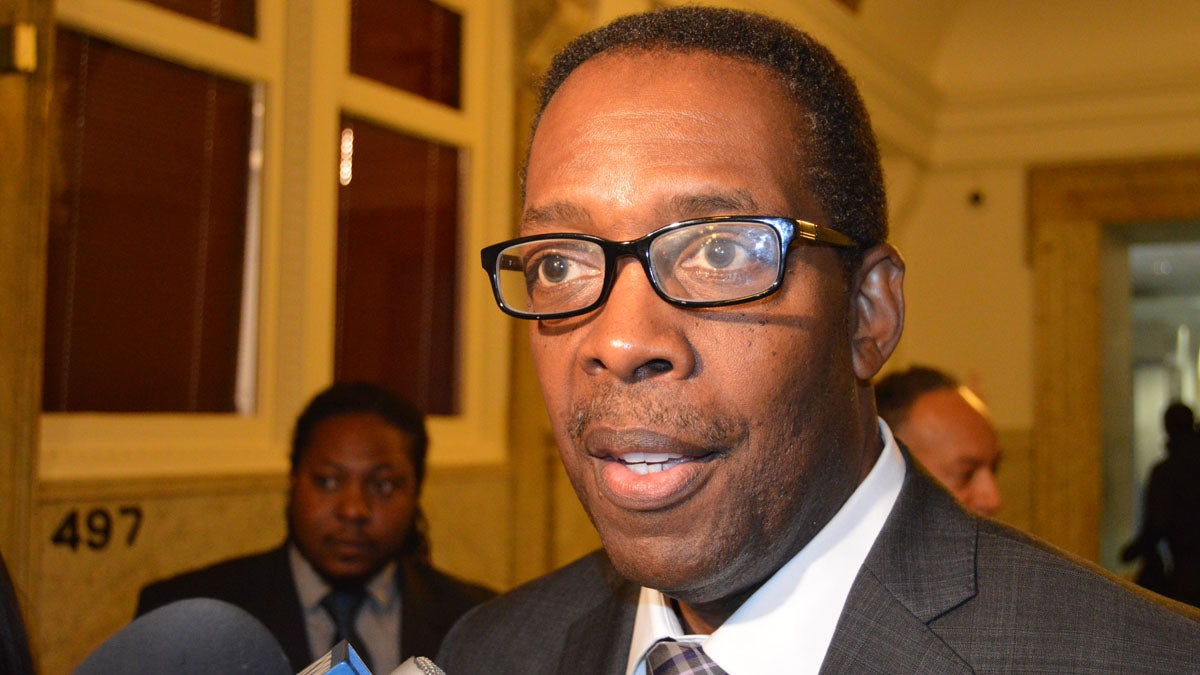A shameful neglect of duty

Philadelphia Council President Darrell Clarke(Tom MacDonald/WHYY)
I thought maybe after a busy week covering the election, I’d be able to let it go.
But I can’t, so I’ll just say it: City Council President Darrell Clarke’s decision to scrap the proposal to sell the Philadelphia Gas Works without so much as a single public hearing is a disgraceful, cowardly abdication of leadership, and every member of Council is complicit in the act.
There are plenty of reasons to consider Mayor Michael Nutter’s proposal to sell this historically troubled utility and get a shot of cash for our pension fund and, no doubt, many reasons to hesitate, too.
But we won’t hear them, because Council didn’t have the guts to let all sides make their cases in public, and, more importantly, call the roll and require members to make a decision.
It’s what you’re elected (and paid) to do, folks, not hide under your desks when you’re confronted with a controversy.
A history of debate
I’ve been around here a long time, and I’ve seen City Council excoriated by business and civic leaders in the past for refusing to rubber-stamp proposals from mayors, instead vetting them in public hearings.
My favorite example is from the 1980s, when America discovered the environmental damage of discarded trash and began closing landfills.
Confronted with skyrocketing disposal costs, the administration of Mayor Wilson Goode developed a plan to contract with a private company that would built a massive trash-to-steam plant in South Philadelphia. The city would get a reliable place to dump its trash and commit to 30 years of payments for privilege.
Council balked. Members wanted to review the environmental and financial risks, let communities have their say, consider alternatives, the works. This took time, of course. Experts had to be consulted, facts assembled and considered.
What are these knuckleheads doing, business leaders fumed. Just get it done, pass it. But Council held a series a public hearings and, in the end, effectively killed the idea by imposing conditions that made the deal unworkable.
And you know what? It was the right decision. In a few years, environmentally safe landfills opened, disposal costs declined, and the city found plenty of affordable places to take its trash. If the city had committed to the administration’s plan, it would have been stuck paying high tipping fees for decades.
My point is that democracy often works. When we have one of these huge, far-reaching, long-term decisions that affect the city’s future, the right course is to have a full and fair airing of the issue.
I’ve seen the process work again and again: when we considered building the Convention Center in the late ’80s; when we established the Center City District in early ’90s; when we built the sports stadiums and expanded the center in the 2000s. There was controversy in every case — and in every case, the outcome improved with public input.
What happens this time? The Council president gets the PGW bill from the mayor, refuses to have it introduced, hires a consultant to examine it, keeps the consultant’s findings from the public, and then after some mysterious process of internal review and discussion with members, decides to scrap the deal and announce what Council as a body thinks of the whole thing.
The state open meetings law requires Council to deliberate and take votes in public. We don’t know what happened here.
According to the Inquirer, most Council members didn’t get a copy of the consultant’s report until their decision was as announced. Some said they’d gotten staff briefings and were given summary sheets they had to turn in before they left – a stirring example of democracy at work.
Is it over?
Any member of Council can introduce the PGW bill, and if that happens five members can back a resolution to give it a public hearing.
There’s no sign that will happen at the moment. It’s a tricky issue for a lot of members. Some were inclined to favor the sale or were willing to consider it for the business community, but feared a backlash from public employee unions or constituents uncomfortable with idea the city giving up PGW.
Indeed, I think one reason Clarke took the extraordinary step of killing the bill before it was introduced was to save his members from a tough vote.
Again, I say to them: This is your job. Yes, it’s important that you deal with constituent issues and represent your communities, but once in a while we ask you to take on a big decision that affects the whole city and its future. Your refusal to do that in this case is cowardly.
It also occurs to me that this episode offers a clue into the political question of the day: Will Clarke run for mayor next year?
The course he took is certain to alienate business people who might write him checks, but it’s a favor to many of the 16 Council members he relies on to keep the presidency.
If he thought this through before he made the decision, seems to me he’s signaling that he plans to stay where he is.
WHYY is your source for fact-based, in-depth journalism and information. As a nonprofit organization, we rely on financial support from readers like you. Please give today.


